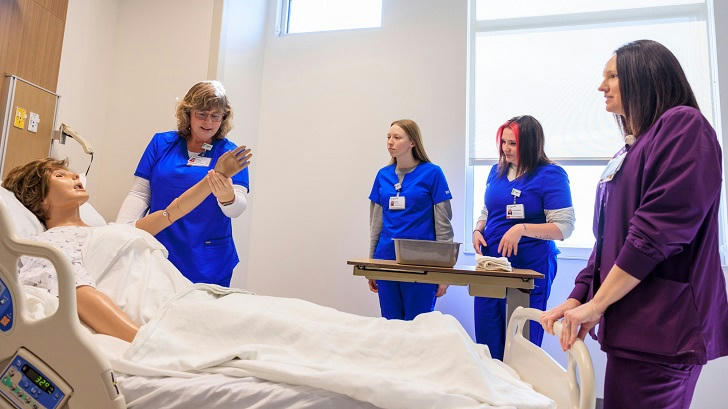CNA Training and Certification: A Comprehensive Guide
Becoming a Certified Nurse Assistant (CNA) is a structured process that combines education, hands-on experience, and certification. Each step is designed to ensure that aspiring CNAs are fully prepared to provide high-quality care in various healthcare settings.

Step 1: Enrolling in a CNA Training Program
CNA training programs are offered by community colleges, vocational schools, and healthcare facilities. These programs typically last 4–12 weeks and include a mix of classroom instruction and clinical practice.
Key topics covered include:
Basic Nursing Skills: Techniques for assisting patients with daily activities.
Emergency Procedures: Responding to critical health situations.
Medical Terminology: Understanding common terms used in healthcare.
Ethics and Patient Rights: Legal responsibilities and ethical considerations in caregiving.

Step 2: Gaining Clinical Experience
Hands-on training is a vital part of CNA education. Students work in supervised clinical environments, practicing skills such as:
Feeding patients and assisting with mobility.
Monitoring vital signs.
Maintaining patient hygiene.

This experience builds confidence and ensures students are ready for real-world challenges.
Step 3: Preparing for the Certification Exam
After completing a training program, students must pass a state-approved certification exam. The exam consists of two parts:
Written Test: A multiple-choice assessment of theoretical knowledge.
Skills Test: A practical evaluation of caregiving abilities.
Step 4: Launching Your Career

Once certified, CNAs can work in various settings, including hospitals, nursing homes, and private homes. The certification also serves as a stepping stone for further education and career advancement.
Case 1: From Zero Experience to Private Caregiver
Background:
Lily, a 22-year-old community college graduate, majored in a non-nursing field but became interested in the healthcare industry. Without a clear career direction, she wanted to enter the workforce quickly and gain experience.
Turning Point:
Lily enrolled in an 8-week CNA program and was promptly hired by a private home care agency. Her focus was on providing one-on-one care to clients from high-income families.
Outcome:
Lily’s hourly wage reached $25, significantly higher than many of her peers’ starting salaries. Her flexible working hours allowed her to gain valuable caregiving experience, laying the foundation for becoming a home nurse or starting her own caregiving service business in the future.
Case 2: From Factory Worker to Inpatient Care Specialist
Background:
John, a former factory worker, endured harsh working conditions and low pay. As he got older, he realized the need to change his career trajectory.
Turning Point:
John took evening CNA courses during his free time and passed the certification exam. He quickly found a job at a rehabilitation hospital, assisting patients in regaining their daily functions.
Outcome:
With strong dedication and excellent performance, John was promoted to Inpatient Care Specialist, handling more complex care tasks. His annual income increased from $25,000 to nearly $50,000, and he found much greater satisfaction in his new career.
Case 3: From Homemaker to Full-Time CNA and Medical Assistant
Background:
Jessica, a 42-year-old homemaker, relied entirely on her husband’s income. With increasing financial pressure, she decided to reenter the workforce.
Turning Point:
Jessica chose a CNA training program as her starting point due to its short duration and affordable cost. After completing the course, she secured a full-time CNA position at a nursing home, earning around $19 per hour. The flexible working hours allowed her to balance work and family life.
Outcome:
Through her CNA experience, Jessica discovered a passion for healthcare. She later pursued a Medical Assistant program and secured a role in a clinic, increasing her annual income from around $25,000 to nearly $45,000. She also gained access to more career development opportunities.
These inspiring stories highlight how CNA training can serve as a powerful springboard for career transformation, financial growth, and personal fulfillment. Whether you’re starting from scratch, seeking stability, or looking to explore new opportunities in healthcare, a CNA certification offers a solid foundation for success.
As the demand for compassionate and skilled caregivers continues to grow, the possibilities for CNAs are limitless. With dedication and continuous learning, you too can carve a rewarding path in this dynamic and meaningful field. Embrace the opportunity, and take the first step toward building a brighter, more secure future for yourself and those you care for. The journey may start with a CNA program, but where it leads is entirely up to you.
